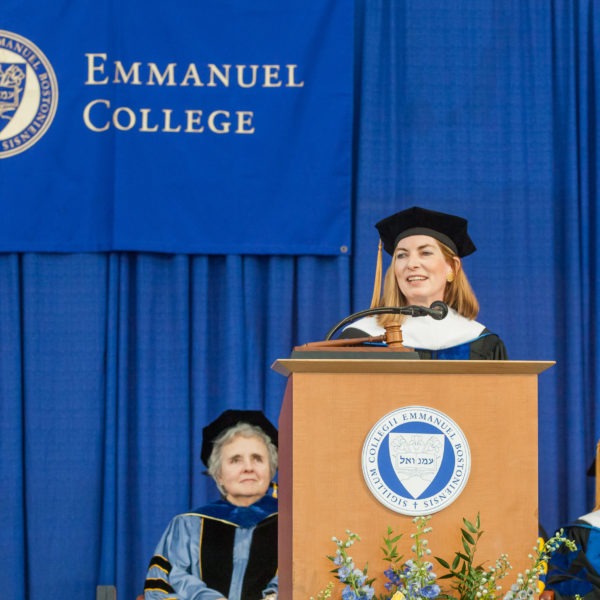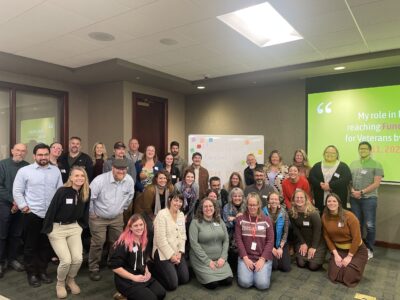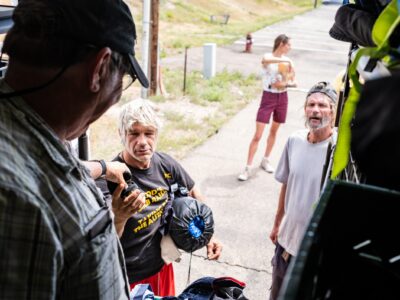This weekend, Community Solutions President Rosanne Haggerty delivered the commencement address to graduates at Emmanuel College in Boston. Below are her remarks as prepared for delivery.
Thank you, President Sr. Eisner, and thank you, all who are part of the Emmanuel community, for your welcome. It is a great privilege to be with you this morning.
As you know, it is customary for a commencement speaker like me to give new graduates like you the best advice I can muster on your last day of college.
Here’s how it usually works:
- I agree to share twelve to fifteen minutes of advice
- You agree to wake up early to be here— possibly earlier than at any other time in your college career
- And in the end, we both get to leave with degrees!
It’s a kind of grand commencement bargain, and it’s worked pretty well for a long time.
But I believe we can do better and given the times we’re living in, I believe we must. So today, I want to change the terms of the deal.
I want to say upfront that I’m not here to give you advice, but to give you a job to do.
Now, it’s not a paying job.
But it’s a critically important one.
And the job description is simple: Take ownership of what happens here.
What do I mean by that? At Community Solutions, the non-profit organization I lead, this is one of our core team values, and we reflect on it regularly. Here’s how one of my colleagues summed it up recently:
“If you find that something is broken, and you can’t figure out whose job it is to fix it— then it’s your job. And the rest of us are counting on you.”
Take ownership of what happens here.
This job is often hard, and you can’t count on being thanked, but being a person who takes ownership will make you a better parent, colleague, friend, professional, and member of every community you are part of it. I hope my intentions in recruiting you to the job will become clearer as we go on. But for now, let me tell you about how I learned this essential lesson.
In the early 1990s, the old Times Square Hotel, New York City’s largest remaining single room occupancy building, was in bankruptcy and facing condemnation. Your parents will remember but you may not, that a single room occupancy building, or SRO, is essentially a very modest residence – a rented room- for those who can’t come up with longer-term rent money. Our cities used to have many of these low cost housing options. You could pay by the week, or sometimes by the night. Historically, SROs played an important role in preventing single people without much money from becoming homeless.
By the time I got involved in trying to save the Times Square Hotel most SROs were on their way out. And this building in particular was really falling apart. A whole floor was burned out. Leaks had caused ceilings to collapse in many places. The stairwells and elevators were precariously unsafe. But I believed that the building could be transformed into a decent place to live and an example of a new, smarter way to address homelessness than opening more shelters.
You see, SROs had been a surprisingly important part of my childhood. I never lived in one, but growing up in Connecticut, I visited one almost every week. On Sundays, my parents would take me and my seven younger siblings to Mass at a church in downtown Hartford, where the other regulars were the elderly people who lived in nearby SROs. We’d visit them after Mass to bring meals or for my parents to help our friends with various government forms or health issues. On holidays our friends would come to our house.
So, as a 29-year-old who understood the importance of SROs, and grew up watching my parents take ownership of the problem of poor elderly people living alone in our community, I developed a plan to buy the Times Square Hotel. I proposed transforming it into 652 well designed and well managed efficiency apartments for homeless and low wage workers, with health, employment and mental health assistance onsite.
It may have been a crazy plan, but it was the only plan that promised to take ownership of a lot of problems. Perhaps out of pity- or fascination-my team’s willingness to own the problems of a troubled building and the need for genuine solutions to homelessness caused many people to come forward to help.
Fast forward: the plan worked. With stable housing, our tenants built new lives and didn’t become homeless again. Their health and mental health improved. The restored building became part of the turnaround of the Times Square neighborhood. And we did it all at a fraction of the cost of allowing people to remain homeless, going in and in and out of costly hospitals and shelters. The project won lots of awards– we were featured on 60 Minutes a few times- our work began to influence government policy locally and nationally. We bought more buildings and over time created more apartments, almost 3,000 in all.
But something was broken.
As individual projects, our buildings were successful, but we lived with an uncomfortable, open secret. Homelessness was increasing. For all our efforts, we weren’t making much of a dent in the problem itself. In fact, we were still passing the same homeless individuals on the street who had been there for years. Somehow our celebrated solution wasn’t reaching them.
Like most people at the time, we accepted the myth that those living on the streets didn’t want help. It seemed clear enough: they would not go to the City’s shelters, where emergency services were available.
But, as you learn, one of the easiest ways to avoid taking ownership of what happens here is to blame other people for the problems you feel too scared to try to solve. But more on that in a minute.
I lost my excuses the day I got a call from a hospital social worker. She told me she was with a woman named Sarah— a frail, elderly woman whom we counted among the ranks of those who didn’t want our help. Street outreach workers had tried for years to get Sarah to go to a shelter. Every time I saw her, I would ask if she needed food or warm clothing. But Sarah ignored all of us.
Now, I was told that Sarah wanted to move into one of our buildings.
This was unprecedented.
We tossed our waiting list aside, and moved her into the first available apartment. When she arrived, a whole group of my colleagues had assembled to greet her, all of us dying to know the why she hadn’t accepted our help sooner.
Sarah looked me in the eye as she answered:
“You only offered me blankets and rides to shelter. What I wanted was a home.”
I was stunned.
We had spent years essentially blaming Sarah and others on the street for their own misery because we had been asking the wrong questions.
Suffice it to say our team began to change course that day. We made it our job to assist the people living on the street the longest in moving into a home, and for cutting through the bureaucracies and barriers in the way. Taking ownership of what was happening meant turning our way of working upside down. It was stressful and took time, but we eventually got good at it, and over the course of four years reduced street homelessness in Times Square by 87 percent and discovered key strategies for ending homelessness everywhere. These insights now fuel our work throughout the country and around the world because in now over 200 places, someone has taken ownership of ending homelessness in their community, brought others together, and asked our team to train them in this ownership way of working. In the last seven years, in this country alone, communities in this movement have matched more than 175,000 chronically homeless people and homeless veterans with homes. Communities now know each homeless person by name. Eight communities have ended chronic or veteran homelessness altogether, with many more approaching that milestone.
Now…why am I telling you this story on the morning of your graduation?
Because here’s what happens: we all tend to assume that the meaningful problems we encounter— injustices, suffering, carelessness, neglect— belong to someone else.
But here’s the truth: These are exactly the problems that will require a volunteer— each of you, I hope— to step forward.
To take ownership of what happens here means you see things that are broken and urgently need fixing; that you move toward the problem even if you don’t know what to do and trust that you will discover what you need to do.
And you will.
We’ve all been in an urgent situation at some point. And if we think back, we remember that in urgent situations, a different version of ourselves emerges. We act instinctively. We seize ideas. We pull people in to help. We discover new strengths. We don’t wait for permission; we just find a way.
We live in a world and an age where it has never been easier to refuse to take ownership. Globalization has knit together our economies, and technology has networked our communication, yet the human connections between us are stressed and broken in many places.
That’s the world you are entering— a fuzzy and unaccountable place where urgency is ignored, responsibility is hard to assign, and no one will blame you or even notice if you decline to take ownership of what happens around you.
But I don’t believe for a minute that those are the kind of people you intend to be.
That’s because I know Emmanuel.
Through your coursework, your activities, and perhaps most of all, your commitment to service rooted deeply in the social teaching of the Catholic Church and the values of Emmanuel, you have been prepared to be ownership kind of people. And what you will find, I think, as you bring that commitment to the world, is that it makes you special.
You will be the ones in your workplaces and communities who will see things that can be better, who will notice people who need help, who will be the problem solvers. You will model what taking ownership looks like and inspire others to be ownership kind of people themselves.
So, let me wrap up this job pitch with a few final questions:
- Are you up for it?
- Will you take what you have learned from your professors and from each other and become people who take ownership of what happens here?
- Will you embrace the twin truths that every problem has a solution, and that every person can be a problem solver, especially you?
- And finally, are you willing to call others in your lives to that same type of work?
If you’re ready to say yes to those questions— and I hope that you are— then I’ve got news for you: You’re hired.
Congratulations, graduates. We can’t wait to see the kind of owners you become.





